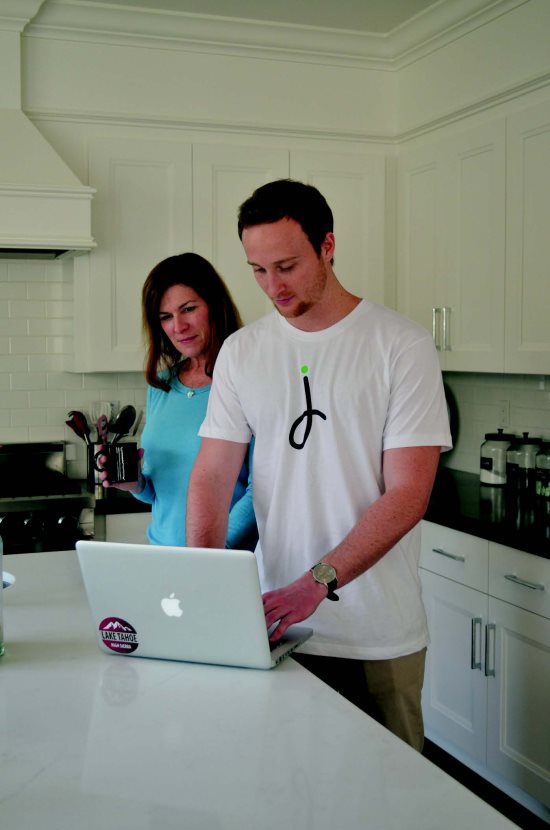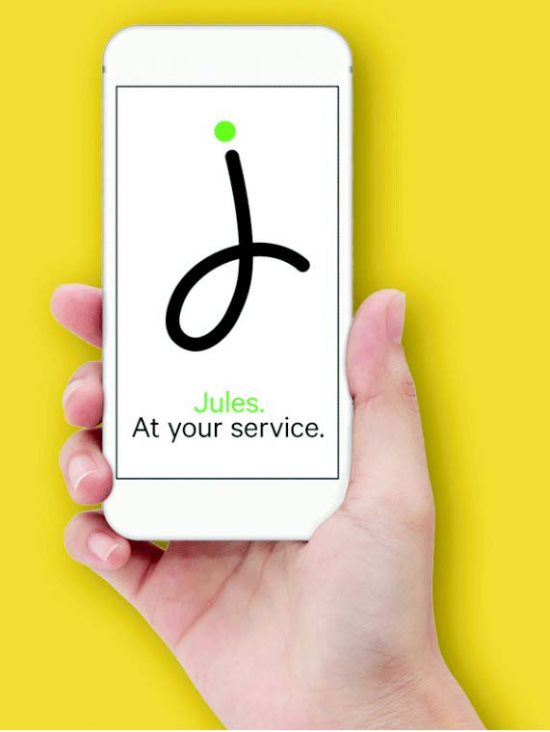 |
|
|
Photos provided Homeowner Lisa Parker looks on as WG tech Tyler Holston uploads data on the Jules app.
|
|
|
|
|
|
Longtime tech entrepreneur and Lafayette resident Kent Godfrey today launched Jules, an application designed to help families manage their busy lives by using a cloud-based service to track many aspects of their homes, belongings and personal information.
 Godfrey envisaged an application that would help families like butler Alfred Pennyworth helped Batman maintain the Bat Cave so that he could spend his time out crime fighting. He raised $2 million in seed money, and started his company, HomeIQ, in early 2017. The company is based locally in Lafayette, although the team of programmers who created the application is based in Romania.
Godfrey envisaged an application that would help families like butler Alfred Pennyworth helped Batman maintain the Bat Cave so that he could spend his time out crime fighting. He raised $2 million in seed money, and started his company, HomeIQ, in early 2017. The company is based locally in Lafayette, although the team of programmers who created the application is based in Romania.
 Godfrey has a track record in the tech area, having created and successfully sold two companies, including Liverail, a video ad tech startup sold to Facebook in 2015 for $500 million. The Jules application, which is available from the App Store or Google Play, is a cloud-based database in which many items can be catalogued and which are then available to the user on any device. For example, information on a major appliance might include the date it was purchased, when it was installed, a copy of the receipt, the warranty information, service record or serial number. If the homeowner has a problem with the appliance, this information can be reviewed to see if the appliance is still under warranty, or with a click sent by email to a repair person to see if a repair can be effected. The app will also have the ability to alert the user to upcoming events, for example, when a vehicle is due for service or when property tax is due to be paid.
Godfrey has a track record in the tech area, having created and successfully sold two companies, including Liverail, a video ad tech startup sold to Facebook in 2015 for $500 million. The Jules application, which is available from the App Store or Google Play, is a cloud-based database in which many items can be catalogued and which are then available to the user on any device. For example, information on a major appliance might include the date it was purchased, when it was installed, a copy of the receipt, the warranty information, service record or serial number. If the homeowner has a problem with the appliance, this information can be reviewed to see if the appliance is still under warranty, or with a click sent by email to a repair person to see if a repair can be effected. The app will also have the ability to alert the user to upcoming events, for example, when a vehicle is due for service or when property tax is due to be paid.
 The app has been in development for about two years, and for the past six months has been beta tested by about 175 clients. As an example of how Jules can be of assistance, Godfrey said that his daughter was planning a trip abroad, but about three months before the event Jules reminded her that her passport was going to expire, allowing her to renew it before her trip.
The app has been in development for about two years, and for the past six months has been beta tested by about 175 clients. As an example of how Jules can be of assistance, Godfrey said that his daughter was planning a trip abroad, but about three months before the event Jules reminded her that her passport was going to expire, allowing her to renew it before her trip.
 The Jules database contains over 300 item types, from home appliances to personal items such as cars, jewelry and art. It also covers personal information, keeping track of passwords and important documents such as wills and trusts, in addition to items such as passports, drivers' licenses, social security numbers, and insurance policies. Documents and photographs can be attached. Data can be added to the app by the homeowner or the company also offers a "white glove" service where company staff will input the information for the homeowner.
The Jules database contains over 300 item types, from home appliances to personal items such as cars, jewelry and art. It also covers personal information, keeping track of passwords and important documents such as wills and trusts, in addition to items such as passports, drivers' licenses, social security numbers, and insurance policies. Documents and photographs can be attached. Data can be added to the app by the homeowner or the company also offers a "white glove" service where company staff will input the information for the homeowner.
 While the app provides strong security, using Rock Space for its cloud-based storage, requiring strong passwords and employing sophisticated encryption, users are free to include only so much information as they wish. So, for example, if a user feels uncomfortable providing some information, such as a passport number, the user need not enter it into the database. Of course, only information that is provided can be made available to the user on any device. Still, Godfrey estimates that of the over 300 items catalogued, only about 10 could be deemed sensitive.
While the app provides strong security, using Rock Space for its cloud-based storage, requiring strong passwords and employing sophisticated encryption, users are free to include only so much information as they wish. So, for example, if a user feels uncomfortable providing some information, such as a passport number, the user need not enter it into the database. Of course, only information that is provided can be made available to the user on any device. Still, Godfrey estimates that of the over 300 items catalogued, only about 10 could be deemed sensitive.
 Godfrey says that the app is targeted at higher-end homes, or about 25 million homes out of the approximately 130 million households in America. This means that the homes targeted are 2,500 square feet and above and cost upwards of $1 million. This demographic also includes larger family size, and they tend to gather in clusters. A good example is the Lamorinda area, and the Highway 680 corridor. Godfrey emphasizes the security that the app can provide to homeowners, especially when there is a growing awareness of the possibility of natural disasters. He points out that the homeowner who loses everything needs to be able to document that the items existed and that it was in the home when it was destroyed. Jules can provide an inventory of home contents, including valuations. He notes that during the trial period, two Jules beta testers did lose homes in the recent fires.
Godfrey says that the app is targeted at higher-end homes, or about 25 million homes out of the approximately 130 million households in America. This means that the homes targeted are 2,500 square feet and above and cost upwards of $1 million. This demographic also includes larger family size, and they tend to gather in clusters. A good example is the Lamorinda area, and the Highway 680 corridor. Godfrey emphasizes the security that the app can provide to homeowners, especially when there is a growing awareness of the possibility of natural disasters. He points out that the homeowner who loses everything needs to be able to document that the items existed and that it was in the home when it was destroyed. Jules can provide an inventory of home contents, including valuations. He notes that during the trial period, two Jules beta testers did lose homes in the recent fires.
 There are plans to use the database to provide further services for the homeowner in the future. For example, a service that will help homeowners objectively determine the proper level of insurance for their belongings, possibly saving them money by eliminating unnecessary coverage. If the owner of a vehicle, for instance, would not make a claim on insurance for any damage under $2,000, but carries a policy with a $500 deductible, savings would probably be available if the deductible were raised to at least $2,000. There will also be a program to explain basic insurance terms in simple English.
There are plans to use the database to provide further services for the homeowner in the future. For example, a service that will help homeowners objectively determine the proper level of insurance for their belongings, possibly saving them money by eliminating unnecessary coverage. If the owner of a vehicle, for instance, would not make a claim on insurance for any damage under $2,000, but carries a policy with a $500 deductible, savings would probably be available if the deductible were raised to at least $2,000. There will also be a program to explain basic insurance terms in simple English.
 Godfrey believes that most people cannot fully comprehend an insurance declaration page, although all the important information is included, as is required by state law. But the presentation is confusing. The first step in evaluating insurance is to list the details of the policy with pop-up explanations of the terms. The second step would be a list of possible events, which also predicts the likely outcome of such events.
Godfrey believes that most people cannot fully comprehend an insurance declaration page, although all the important information is included, as is required by state law. But the presentation is confusing. The first step in evaluating insurance is to list the details of the policy with pop-up explanations of the terms. The second step would be a list of possible events, which also predicts the likely outcome of such events.
 Currently, the base model is available to subscribers. Membership is offered at $135
Currently, the base model is available to subscribers. Membership is offered at $135
 per year or $15 per month for 5G cloud storage of information on unlimited properties. Godfrey says that with only one email sent to the current beta members, he was pleasantly surprised to already have 72 members, 41 who have signed on as payment members and the rest availing of a 90-day free trial.
per year or $15 per month for 5G cloud storage of information on unlimited properties. Godfrey says that with only one email sent to the current beta members, he was pleasantly surprised to already have 72 members, 41 who have signed on as payment members and the rest availing of a 90-day free trial.
 Info: https://julesapp.com
Info: https://julesapp.com
|

